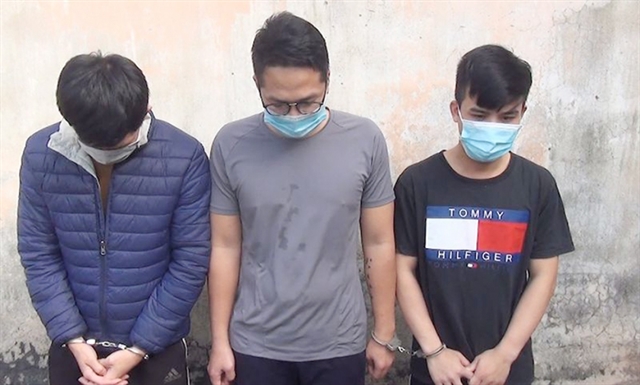 Society
Society

 |
| A group of criminals involved in a fraud scheme on Facebook. — Photo from the police |
HÀ NỘI — Many criminals are using a new scheme, taking advantage of videocalls to swindle people.
The scheme, which involved using unauthorised images of people's relatives, has fooled many people into giving money to the swindlers.
N.T.H., living in Hà Nội recently got a message from a colleague asking for a loan. As the amount of money was VNĐ20 million (US$850), H. was careful enough and asked for a videocall to verify.
An image of the colleague popped up, but the call was stopped after a few seconds, with the caller citing faulty network conditions.
Believing that the caller was speaking the truth, H. transferred the money, only to find out that her colleague posted on social media that her Facebook account had been compromised.
Hoàng Thị C., of Quỳnh Phụ, Thái Bình encountered a similar situation. A message came from her cousin's Facebook account asking for a videocall.
C. agreed, and again an image of her cousin popped up, but the caller hung up after a few seconds. The caller said that she cannot complete the call due to network issues, and asked C. for a loan of about VNĐ10 million (US$425) for her business in the Czech Republic.
C. did not hesitate and decided to transfer the money, but later found out that she was swindled.
With technology, it is not hard for criminals to scam people nowadays, said experts. After compromising a user's social media account, the criminal would then take advantage of a picture or a video clip posted by the user, and use it as a video when they are asked to call.
The scheme requires low quality network signals for it to be foolproof, as the fraudsters only want the victims to see the account owner's face to build trust. After the face is seen and recognised, the criminals rely on faulty connections to hang up.
"This scheme can happen to anyone, and anywhere," said Lieutenant Colonel Nguyễn Tiến Vượng, Captain of the Cybersecurity and Anti High Tech Criminal Department.
According to the Cybersecurity and Anti High Tech Criminal Forces, Ministry of Public Security, criminals might even use a technology called Deepfake to fake a person's appearance, and create a video of a person's relative to ask for money.
Although these fraudulent schemes have been publicised widely, many people still fell for them. Victims are even reluctant to report to police authorities, leaving the total number of cases far greater than reported.
The Ministry of Public Security recommends people be vigilant when receiving letters or messages asking to transfer money.
People should avoid verification via video call, but instead ask to meet in person.
The MPS also advised people not to disclose too much personal information on social networks, thus making it easier for criminals to build sophisticated phishing scenarios.
People should not provide personal information such as phone numbers, home addresses, information about bank accounts, accounts of Internet services, etc., to any strange individuals or organisations when they have no premises. If there is a suspicion of fraudulent activities to appropriate property, it is necessary to promptly notify the nearest police agency for guidance. — VNS




